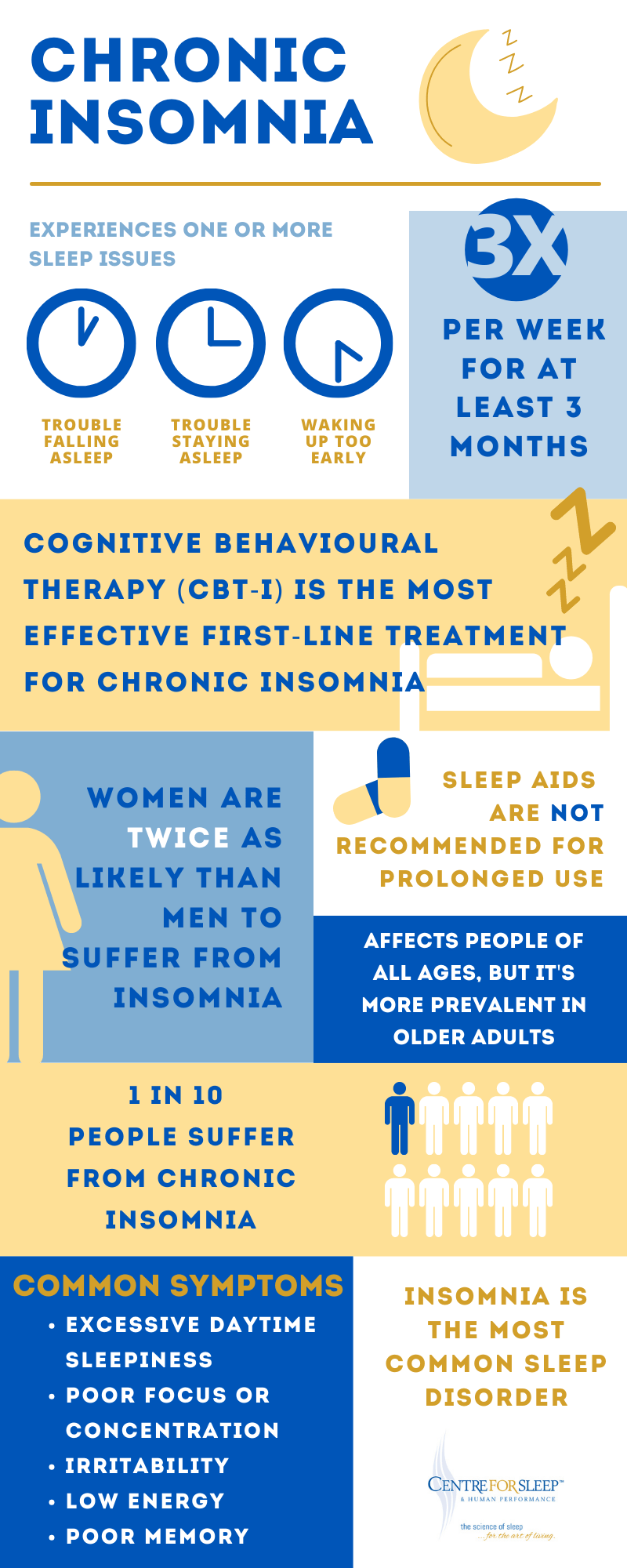
Spotlight on Insomnia
Share
ACUTE VS. CHRONIC INSOMNIA
It's common to struggle with sleep every now and then. Perhaps you are coping with work or financial stress, or have just experienced the loss of a loved one. Short-term insomnia, or acute insomnia, can last anywhere from a few days to a few weeks, and most adults have experienced it at some point in their lives. Going a few nights, or more, without adequate sleep can leave you feeling irritable, sluggish, and forgetful. This is because most adults need between 7 and 9 hours of sleep each night, so not getting what our brains and bodies require can result in impaired cognitive function, workplace errors, moodiness, poor dietary choices, and compromised immunity. Fortunately, once your acute insomnia has passed, so too should the associated effects.
For some people, however, insomnia can last for months or even longer. This is considered chronic insomnia, a sleep disorder that affects approximately 1 in 10 people. Chronic insomnia is defined as the inability to fall asleep and/or stay asleep despite adequate opportunity for sleep, at least three times a week, for three months or more. The long-term effects of sleep loss are associated with a wide range of adverse health consequences including an increased risk of hypertension, diabetes, obesity, depression, heart attack, and stroke.
CAUSES
Insomnia has many potential causes or even a combination of causes. Some common ones include:
STRESS
Stress can cause our minds to be overactive at night, making it difficult to fall asleep. Traumatic life events, such as the death of a loved one, may also lead to insomnia.
LIFESTYLE/HABITS
Some habits that can lead to sleep issues include:
- Technology use too close to bedtime
- Irregular sleep/wake schedule
- Too much caffeine and/or having it too late in the day
- Drinking alcohol before bed
IRREGULAR SLEEP SCHEDULE DUE TO WORK/TRAVEL
Our sleep is guided by our internal clock, or circadian rhythm and disruptions to our circadian rhythm can lead to sleep problems. People who work shift work, or who travel across time zones are vulnerable to this.
MENTAL HEALTH DISORDERS
There is a strong connection between insomnia and certain mental health conditions, such as depression and anxiety. People who suffer from depression or anxiety often struggle with sleep issues. Further, sleep issues can exacerbate or give rise to mental health issues.
TREATMENT
Making lifestyle changes, such as avoiding or reducing caffeine and alcohol, keeping a consistent and relaxing bedtime ritual, and setting a technology curfew, can often be very helpful. These are also excellent tools for insomnia prevention. However, if these strategies don't work, and you are struggling to function during the day, you should talk to your doctor. You may be referred to a sleep clinic for assessment.
COGNITIVE BEHAVIOURAL THERAPY FOR INSOMNIA (CBT-I)
Your doctor may suggest Cognitive Behavioural Therapy for Insomnia (CBT-I), which is considered to be the most effective first-line treatment for chronic insomnia. Unlike with sleeping pills, CBT-I helps you overcome the underlying causes of the insomnia. It is a program that teaches you to identify and eliminate thoughts and behaviours that are hindering your sleep and replace them with behaviours that promote healthy sleep.
Reposted with permission from the Centre for Sleep & Human Performance Original Article
